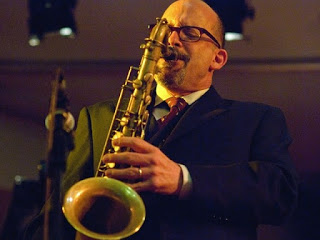It is rare to find a jazz musician who is proficient in all styles of jazz today. Dan Block is one such rare individual who can fit into any musical style with ease on many instruments. Block continues to search for musical connections and discovers his own style. Kurt Vonnegut is one of his favourite authors. Block, a St. Louis native, took up the saxophone shortly before his fourteenth birthday. He then picked up the trumpet and clarinet the next year. It was a memorable experience to hear Eubie Blake perform at the St. Louis Ragtime Festival, and then being exposed to John Coltrane’s music for the first-time all within the same week. He was heavily influenced by both classical music and Great American Songbook songs. He was a keen student of classical music and he never wanted to leave jazz. He was fortunate to have the opportunity to perform on Charles Mingus’ last album, which featured a “who’s who” of saxophonists as well as trombonists, trumpeters, trombonists, and rhythm section players. He was a keen observer of the loft scene and participated in jam sessions with both the established musicians and the newer ones. He studied at Juilliard with Joe Allard, the legendary guru of the Saxophone. He was also trained in chamber music by Robert Bloom, the great oboist. He was privileged to be a Juilliard Orchestra member and played under the tutelage of Leonard Bernstein, George Solti, and Zubin Mehta. Wynton Marsalis, who was also a student at the Juilliard Orchestra at that time, formed a friendship with him. That friendship continues to this very day. Dan is a frequent collaborator with the Lincoln Center Jazz Orchestra. After graduating, he began to work with Haitian musicians and discovered the roots of jazz within this West Indian Diaspora. Block discovered his true style in the popular music “Compas Direct”, which has the same beat and bass as traditional jazz. Block became a well-known player and arranger in the Haitian community. He also traveled extensively throughout France, Quebec, Guadeloupe and Haiti. Block left the Haitian music scene to continue his work as an arranger. He wrote for many chamber groups, both in jazz crossover and classical genres. His most notable arrangement was a quartet of Monk compositions that the New York Saxophone Quartet commissioned and which was recorded on their album “Urbanology”. He also began to work with Vince Giordano’s Nighthawks, the most authentic repertory group of the 20s and 30s. He has been with Vince for many years, performing at venues such as the Newport Jazz Festival and Jazz at Lincoln Center. He is well-known in jazz circles for his work with legends like Ralph Sutton, John Bunch, and Warren Vache. In more modern circles, he has worked with Bennie Wallace and Howard Johnson. His conservatory background allowed Block to supplement his income by working in Broadway pits or freelance orchestras such as The Orchestra of St. Lukes and The New York Chamber Symphony. Block has been featured on many television and radio commercials, as well as soundtracks for motion pictures and television. Recently, Dan’s clarinet u0026 saxophone were featured on the soundtrack of the HBO series “Boardwalk Empire”. A Grammy Award was just given to the compilation CD. Block’s music has a thematic quality which has been a benefit to singers. He has worked with many of them, including Rosemary Clooney and Bobby Short, as well as Tony Bennet and Rosemary Clooney. Block is a regular contributor to jazz parties in San Diego, San Diego and Norwich. He has forged strong working relationships with Joe Wilder, Jake Hannah, Dan Barrett and Bucky Pizzarelli. He has shared the stage at various festivals with Benny Green, Roland Hannah and Clark Terry. For his latest CD, “Duality”, he received four stars from Downbeat and was ranked fourth in the Downbeat critics’ poll for clarinet. Dan is currently performing in the Broadway musical “After Midnight”, which Wynton Marsalis handpicked to feature the Jazz at Lincoln Center All Stars. Block loves communication more than anything. Block finds the most difficult and highest form of jazz music to be able to weave contrapuntal lines together with like-minded instrumentalists. It is a great way to have a real connection with other musicians. Block, a teacher of jazz history, emphasizes these connections throughout the story. He condenses it into one language. Music cannot be separated into musical cliques. We must all come together and communicate with one another. from www.danblockmusic.com
